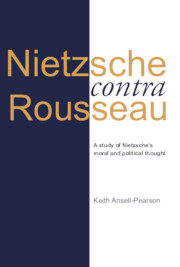Book contents
- Frontmatter
- Contents
- Preface
- Note on the texts and list of abbreviations
- Introduction
- 1 Nietzsche contra Rousseau
- 2 Civilization and its discontents: Rousseau on man's natural goodness
- 3 Squaring the circle: Rousseau on the General Will
- 4 Nietzsche's Dionysian drama on the destiny of the soul: on the ‘Genealogy of Morals’
- 5 Zarathustra's descent: on a teaching of redemption
- 6 Bending the bow: great politics, or, the problem of the legislator
- Conclusion
- Notes
- Bibliography
- Index
4 - Nietzsche's Dionysian drama on the destiny of the soul: on the ‘Genealogy of Morals’
Published online by Cambridge University Press: 03 May 2011
- Frontmatter
- Contents
- Preface
- Note on the texts and list of abbreviations
- Introduction
- 1 Nietzsche contra Rousseau
- 2 Civilization and its discontents: Rousseau on man's natural goodness
- 3 Squaring the circle: Rousseau on the General Will
- 4 Nietzsche's Dionysian drama on the destiny of the soul: on the ‘Genealogy of Morals’
- 5 Zarathustra's descent: on a teaching of redemption
- 6 Bending the bow: great politics, or, the problem of the legislator
- Conclusion
- Notes
- Bibliography
- Index
Summary
He who has grown wise concerning old origins, behold, he will at last seek new springs of the future and new origins.
‘Of Old and New Law-Tables’, Thus Spoke ZarathustraTHE SELF-OVERCOMING OF MORALITY
Both Rousseau and Nietzsche offer a teaching on how to live one's life which is in accordance with nature. But where nature is conceived as moral by Rousseau, it is understood as decidedly immoral by Nietzsche. In Rousseau the notion of pity is used to support the claim that man is naturally good. Similarly, in Nietzsche the notion of will to power is employed to support a philosophy which seeks to be beyond good and evil. Does this mean, therefore, that with the notion of will to power Nietzsche offers us a new natural law to take the place of the old ones which, once supported by metaphysical and moral arguments for the existence of God, are now no longer tenable in the age of the death of God? Interestingly, Nietzsche does speak of ‘self-overcoming’ (Selbstüberwindung) in terms of being a ‘law of life’ (Gesetz des Lebens). But Nietzsche's teaching is that there is neither a fixed and immutable human nature for the individual to live in accordance with, nor an eternal moral order on which one could base a deduction of the social and political. Rather, it is the law of life that everything must overcome itself again and again without final goal or ultimate purpose.
- Type
- Chapter
- Information
- Nietzsche contra RousseauA Study of Nietzsche's Moral and Political Thought, pp. 102 - 151Publisher: Cambridge University PressPrint publication year: 1991



